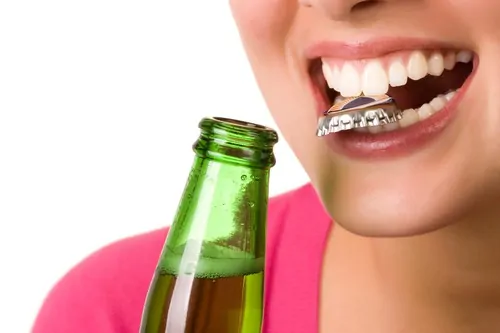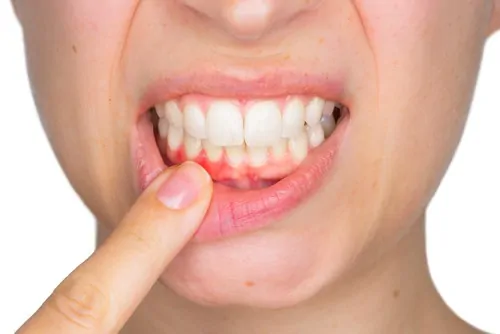Blog
6 Worst Habits for Your Smile

We all know that eating or drinking too much sugar can cause cavities, and by now we should all be aware of the oral health risks associated with smoking or tobacco use. But these common facts aren’t the only habits that may be affecting your smile. At our dental office in Douglasville, we know plenty of other habits that can be just as damaging. Check out some of the top, and perhaps surprising, culprits.
Biting Your Nails
Nail biting is an incredibly common habit that comes with its share of harmful side effects. Not only can biting your nail expose your body to the tons of bacteria that live under the nail, it can also cause damage to your jaw and smile. The act of nail biting cause the jaw to protrude at an unnatural angle, placing pressure on your jaw joint. If the habit continues, you could experience TMJ or TMD. What’s more, nails are made of a hard material and biting them off can cause teeth to chip or break.
Eating Ice Cubes
Ice cubes have one purpose and one purpose only — to make things cold. However, some individuals have a difficult time keeping themselves from chewing on these frozen cubes of water. Crunching on ice is a sure way to create tiny chips in the teeth, leaving them exposed to bacteria that cause cavities. Eating ice can also lead to bigger cracks or breaks that require cosmetic dentistry to fix.
Sucking on Lemons
Exposing your teeth to lemons also exposes them to the high amount of acid found in these colorful fruits. Acid of any kind erodes the protective layer of tooth enamel. Once the enamel is gone, you may experience increased tooth sensitivity as well as an increased risk for decay.
Brushing Your Teeth Too Hard
Your dentist in Douglasville encourages you to brush your teeth twice a day, but not just any type of brushing will do. Any scrubbing motion or using too much pressure can cause gums to recede. Instead, brush using gentle circles to get your smile clean and keep it protected.
Clenching and Grinding
Some people find themselves clenching or grinding in moments of stress. Others do it while they’re sleeping and don’t even know it. Either way, there are various types of dental issues that can occur as a result including jaw pain (TMJ/TMD), worn down teeth, or broken teeth.
Using Teeth as Tools
We’ve all used our teeth to open pesky packaging or to hold something when our hands were full, however it’s really not recommended. Ripping open stubborn packages or using your teeth for anything other than eating can chip teeth or cause other damage.
The team at our Douglasville dental office would prefer if all of our patients and neighbors had perfectly healthy smiles and never encountered any problems, which is why we put so much emphasis on preventing dental issues from ever occurring by educating them on things just like this. But we understand that things do happen, and when they do, we’re more than happy to help.
How to Spot Receding Gums

Receding gums is one of the most common ailments that the patients at our dental office in Douglasville experience. While gum recession is treatable, it can still be painful and sometimes scary to wonder what is going on inside your mouth. In this blog, we’re going to cover how to spot signs of gum recession and some of the reasons as to why this happens in the first place.
Why Do Gum Recede?
Let’s first take a look at why gum recession happens so we can better understand what it is and how to prevent it. While there are numerous causes to gum recession, some even out of our control, the most common reasons tend to be:
- Brushing too hard
- Grinding your teeth
- Tobacco use
- Genetics
- Gum disease
Knowing this, there are steps you can take to reduce your risk of receding gums. First, make sure you’re brushing and flossing everyday. Next, make sure that when you do brush you’re using a soft-bristled toothbrush and a gentle circular motion. Stopping the use of tobacco will not only lower your risk of gum recession but also all kinds of cancer, tooth loss, and stained teeth. While you can’t do much about your genetics, you can do something about catching any dental problems, including gum recession, early.
Recognize the Signs of Gum Recession
The best way to catch gum recession is to make sure you see your dentist in Douglasville at least every six months. Regular visits help get a trained eye on your oral health and it’s the ideal way to identify any dental problems early when treatment tends to be more successful. But dental visits aren’t the only way to help protect your oral health. There are things you can monitor at home in between visits too. Keep a lookout for any of the following and notify your dentist of any concerns:
- Tiny indentations in the teeth close to the gum line
- Teeth that appear longer
- Sensitive teeth
What Happens if Gum Recession Isn’t Treated?
Obviously we’re big fans of getting treatment for gum recession (or any other oral health concern). But why are we in favor of it so much? Because of the wide-spread problems that can happen if treatment doesn’t happen, including:
- Severe inflammation and tooth pain
- Increased susceptibility to bacteria
- Eventual tooth loss
If you suspect that your gums are receding, we’d love to help. Call our Douglasville dental office to schedule an appointment.
